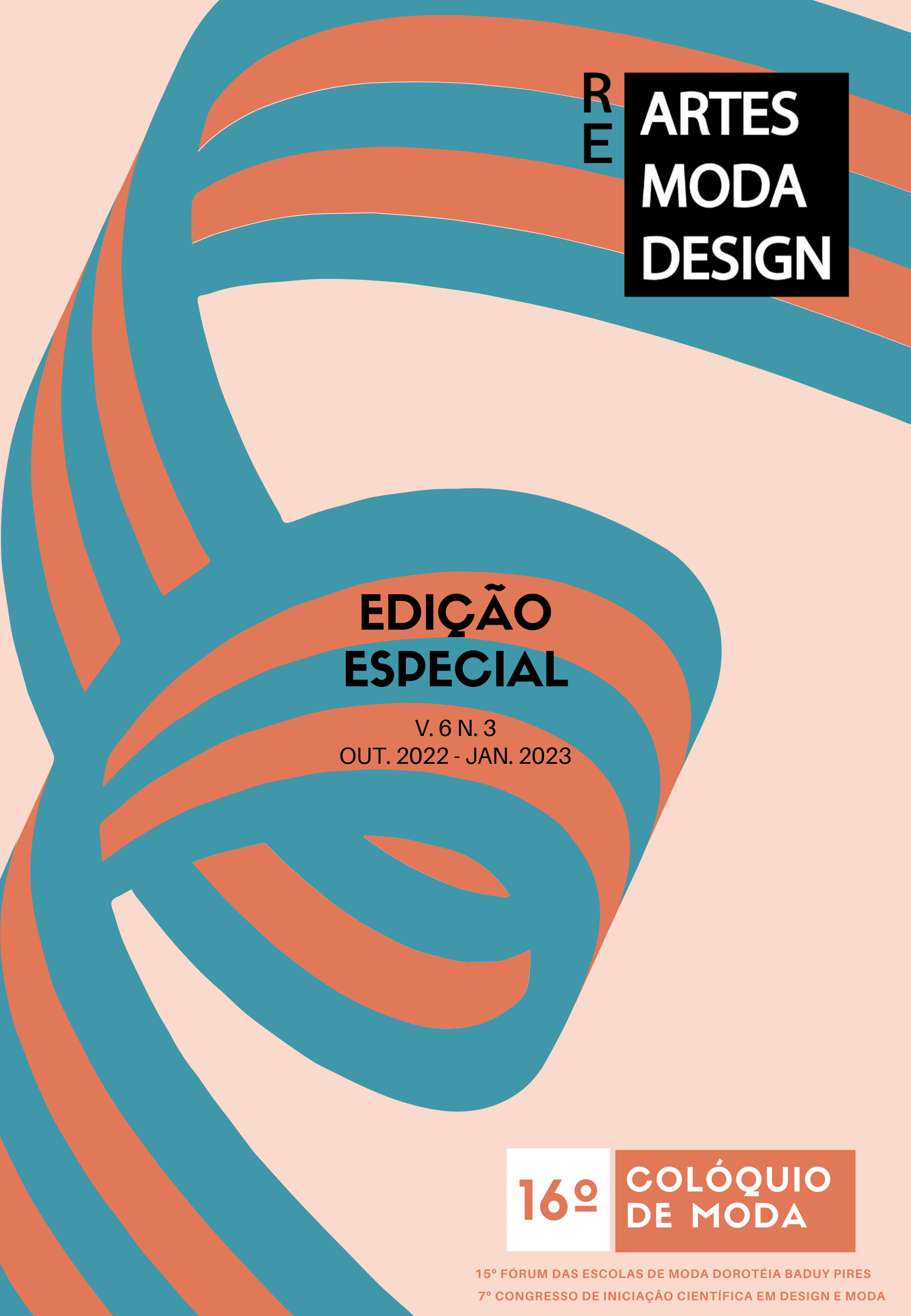Horror, halloween and MOSCHINO's spring/summer collection + 2020 resort fashion monstruous narrative
DOI:
https://doi.org/10.5965/25944630632022e2254Keywords:
Horror, Fashion, Fashion NarrativeAbstract
The present research seeks to understand the fashion narrative created by Jeremy Scott for the spring/summer + resort 2020 collection of the irreverent and fun brand MOSCHINO, and the implications and messages present in it through the ideology of horror, proposed by Barry Grant (2010), that permeates it. Furthermore, horror films and the celebration of halloween are brought to the discussion, along with their dynamics and pop culture status which involve the viewer in an immersive experience. These elements support the analysis of the show, from its setting to the pieces presented by designer Jeremy Scott. At the end, a reading of the analyzed fashion narrative is presented, which comprises MOSCHINO in the fashion world as a creative, playful brand, endowed with subversive potential that beckons to both sociocultural realities and pop culture.
Downloads
References
BAUMAN, Zygmunt. Retropia. Zahar, Rio de Janeiro, 2017.
BOSCO, Joseph. Young people’s ghost stories in Hong Kong. The Journal of Popular Culture, 40, 785–807, 2003.
ETZIONI, Amitai. Toward a theory of public ritual. Sociological Theory, v. 18, n. 1, p. 44-59, 2000.
FELTON, Debbie. Haunted Greece and Rome: Ghost stories from classical antiquity. Austin: University of Texas Press, 1999.
GRANT, Barry Keith. Screams on screens: Paradigms of horror. Loading..., v. 4, n. 6, 2010.
KAWIN, Bruce. Horror and the horror film. London, England: Anthem Press, 2012.
KELLY, Simon; RIACH, Kathleen. Halloween, organization, and the ethics of uncanny celebration. Journal of business ethics, v. 161, n. 1, p. 103-114, 2020.
KING, Stephen. Dança Macabra. Rio de Janeiro: Francisco Alves, 1989.
KRACAUER, Siegfried. From Caligari to Hitler: A Psychological History of the German Film. Princeton: Princeton University Press, 1947.
REMSEN, Nick. MOSCHINO – Resort 2020. VOGUE US, 2019. Disponível em: https://www.vogue.com/fashion-shows/resort-2020/moschino#review. Acesso em: 01 jun. 2022.
SIMPSON, Jacqueline; ROUD, Stephen. A dictionary of English folklore. Oxford: Oxford University Press, 2003.
SOARES, Thiago. Abordagens teóricas para estudos sobre cultura pop. Logos, v. 2, n. 24, 2014.
SKAL, David J. The monster show: A cultural history of horror. New York: Macmillan, 2001.
VOGUE US. Moschino: Resort 2020. 2022. Disponível em: https://www.vogue.com/fashion-shows/resort-2020/moschino. Acesso em: 01 jun. 2022.
WOOD, Robin. “An Introduction to the American Horror Film.” In: BRITTON, Andrew; LIPPE, Richard; WILLIAMS, Tony; WOOD, Robin. American Nightmare: Essays on the Horror Film, pp. 7-28. Toronto: Festival of Festivals, 1979.
Downloads
Published
How to Cite
Issue
Section
License
Copyright (c) 2022 Stella Mendonça Caetano

This work is licensed under a Creative Commons Attribution 4.0 International License.
- Authors retain copyright and grant the journal the right of first publication, with work simultaneously licensed under the Creative Commons Attribution 4.0 International License, which allows for:
1. Share — copy and redistribute the material in any medium or format for any purpose, even commercially.
2. Adapt — remix, transform, and build upon the material for any purpose, even commercially.
The licensor cannot revoke these freedoms as long as you follow the license terms.Under the following terms:
1. Attribution — You must give appropriate credit, provide a link to the license, and indicate if changes were made. You may do so in any reasonable manner, but not in any way that suggests the licensor endorses you or your use.
2. No additional restrictions — You may not apply legal terms or technological measures that legally restrict others from doing anything the license permits. -
Plagiarism, in all its forms, constitutes unethical publication behavior and is unacceptable. This magazine uses iThenticate similarity control software.






